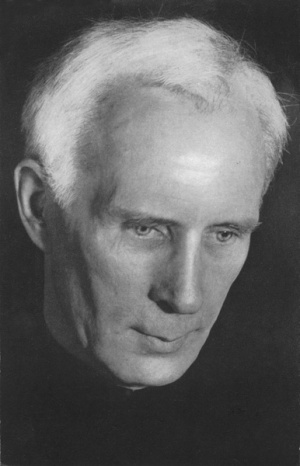Différences entre les versions de « Cardinal Henri de Lubac »
| Ligne 25 : | Ligne 25 : | ||
== Quotes about Cardinal Henri de Lubac == | == Quotes about Cardinal Henri de Lubac == | ||
| − | "In 1944, at a terrible moment of the most terrible century, Henri de Lubac wrote a reflection on Europe's civilizational crisis, Le drame de l'humanisme athée. By "atheistic humanism" he meant the organized rejection of God — not the freelance atheism of individual skeptics but atheism as an ideology and political project in its own right. As de Lubac wrote, "It is not true, as is sometimes said, that man cannot organize the world without God. What is true is that, without God, he can only organize it against man."" | + | "In 1944, at a terrible moment of the most terrible century, Henri de Lubac wrote a reflection on Europe's civilizational crisis, ''Le drame de l'humanisme athée''. By "atheistic humanism" he meant the organized rejection of God — not the freelance atheism of individual skeptics but atheism as an ideology and political project in its own right. As de Lubac wrote, "It is not true, as is sometimes said, that man cannot organize the world without God. What is true is that, without God, he can only organize it against man."" |
*[http://fr.wikipedia.org/wiki/Mark_Steyn Mark Steyn], ''America Alone: The End of the World as We Know It'', quoting [http://en.wikipedia.org/wiki/Henri_de_Lubac Henri de Lubac] in ''The drama of atheist humanism'', Regnery Publishing, 2008 (ISBN 9781596985278), p. 97 | *[http://fr.wikipedia.org/wiki/Mark_Steyn Mark Steyn], ''America Alone: The End of the World as We Know It'', quoting [http://en.wikipedia.org/wiki/Henri_de_Lubac Henri de Lubac] in ''The drama of atheist humanism'', Regnery Publishing, 2008 (ISBN 9781596985278), p. 97 | ||
Version du 26 septembre 2016 à 20:56
Atheism
« Sous les innombrables courants de surface qui portent dans tous les sens la pensée de nos contemporains, il nous a semblé en effet qu’il existait un courant profond, ancien déjà, ou plutôt une sorte d’immense dérive : par l’action d’une partie considérable de son élite pensante, l’humanité occidentale renie ses origines chrétiennes et se détourne de Dieu. […] De plus en plus, l’athéisme contemporain se veut se veut positif, organique, constructif. »
- Cardinal Henri de Lubac, Le Drame de l'humanisme athée (1944), éd. Cerf, 2000 (ISBN 9782204061452), p. 8
« La conviction de Feuerbach et de Marx, aussi bien que celle de Comte et de Nietzsche, était que la foi en Dieu disparaissait pour toujours. Ce soleil tombait sur notre horizon pour ne plus jamais se lever. Leur athéisme se croyait et se voulait définitif, ayant, pensait-il, cet avantage sur les athéismes anciens, d'écarter jusqu'au problème qui avait fait naître Dieu dans la conscience [...]. Cependant, le soleil n'a pas fini de se lever ! Marx n'était pas encore mort, Nietzsche n'avait pas encore écrit les plus brûlants de ses livres, qu'un autre homme, Dostoïevski, génie inquiétant lui aussi, mais plus véritablement prophète, annonçait, par des fulgurations étranges, la victoire de Dieu dans l'âme humaine, son éternelle résurrection. »
- Cardinal Henri de Lubac, Le Drame de l'humanisme athée (1944), éd. Cerf, 2000 (ISBN 9782204061452), p. 10
Socialism
Equality
Democracy
Miscellaneous
Quotes about Cardinal Henri de Lubac
"In 1944, at a terrible moment of the most terrible century, Henri de Lubac wrote a reflection on Europe's civilizational crisis, Le drame de l'humanisme athée. By "atheistic humanism" he meant the organized rejection of God — not the freelance atheism of individual skeptics but atheism as an ideology and political project in its own right. As de Lubac wrote, "It is not true, as is sometimes said, that man cannot organize the world without God. What is true is that, without God, he can only organize it against man.""
- Mark Steyn, America Alone: The End of the World as We Know It, quoting Henri de Lubac in The drama of atheist humanism, Regnery Publishing, 2008 (ISBN 9781596985278), p. 97
